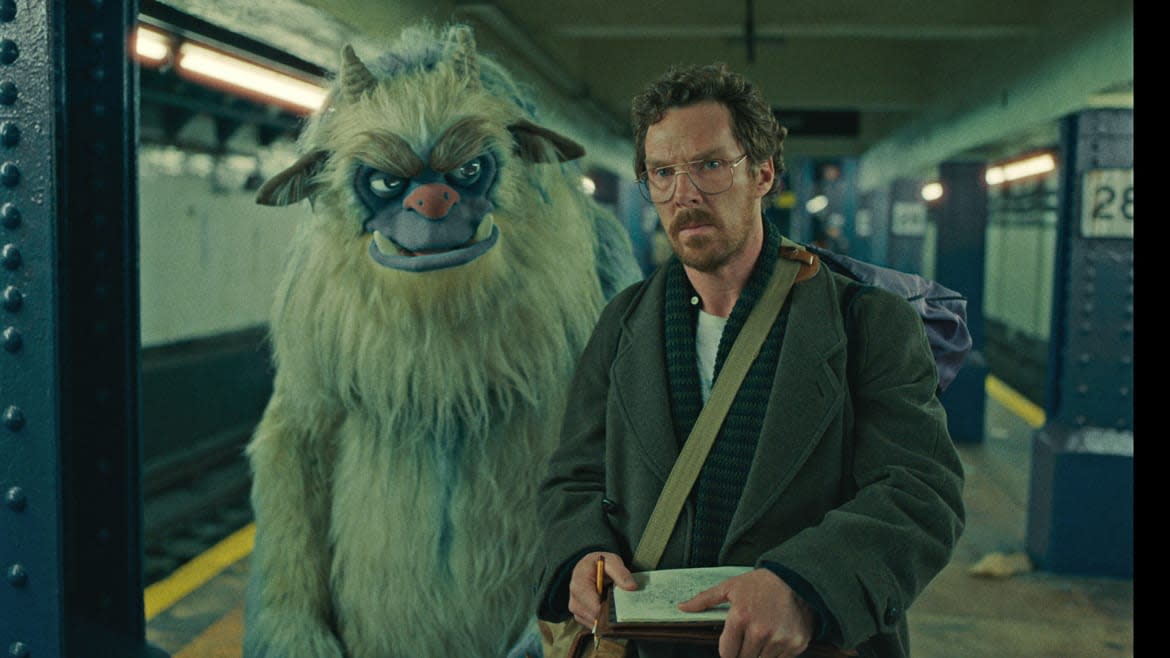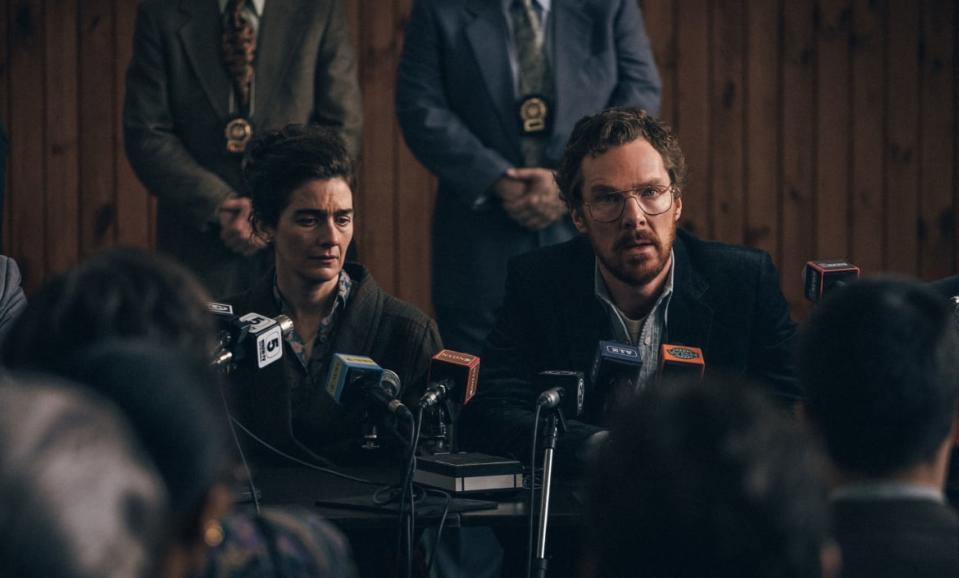‘Eric’: Benedict Cumberbatch Makes for One Lousy Drunk Puppeteer

Eric stars Benedict Cumberbatch as an abusive, alcoholic, asshole puppeteer who, in the wake of his 9-year-old son’s disappearance in 1985 New York City, begins speaking to an imaginary creature that berates him for his numerous shortcomings. Despite that bizarre premise, however, Netflix’s six-part series, which premieres May 30, never generates a single ounce of surrealistic wonder or terror. Flatly executed, incessantly didactic, and distended to twice the length that its story demands, it’s a meandering treatise on the need to “do better” which fails, at every excruciating turn, to heed its own advice.
Written by Abi Morgan and directed by Lucy Forbes, Eric is a showcase for Cumberbatch’s skill at embodying a prick bastard, and he does so with reasonable aplomb as Vincent, the Jim Henson-ish creator of a Sesame Street-style kids show called Good Day Sunshine. The idea that a horrible person like Vincent could be the mastermind behind a feel-good program like this is contrived nonsense. In terms of the series’ subsequent missteps, though, it’s merely a minor speed bump. Vincent loves to drink and fight with his wife Cassie (Gabby Hoffmann), and this greatly upsets his adolescent boy Edgar (Ivan Morris Howe), who can’t even get his father’s attention by showing him the new character he’s invented: Eric, a big furry behemoth with a zig-zagging stripe down his back whom Edgar believes would be a perfect addition to the Good Day Sunshine roster.

Audiences may initially assume that Vincent doesn’t care about Eric because he looks like a rip-off of Monsters, Inc.’s Sully, but it’s actually because he’s a selfish lout who takes after his own despised father, powerful real-estate magnate Robert (John Doman). The morning after another row between the couple, Cassie tells Vincent to walk Edgar to school. Instead, he lets the boy go alone, and upon returning home from work that night, Vincent hears that Edgar has vanished. This prompts panic and guilt, as well as the appearance of Michael Ledroit (McKinely Belcher III), who heads up the NYPD’s missing person’s unit. Michael suspects that Edgar’s fate may be linked to nearby nightclub The Lux, whose owner Gator (Wade Allain-Marcus) was previously sent to prison for pimping out underage boys at his prior establishment. When he visits the hot spot (while wearing a wire), Michael runs into two vice squad cops who are beating up a shady Gator underling and talking about a mysterious “#8.” When he brings this information to his boss, Captain Cripp (David Denman), Michael is told to leave it alone.
Eric begins intriguingly yet almost immediately expands its story into unnecessary and preachy areas. Michael is a gay man who detests his colleagues’ (and society’s) homophobia and is living with a lover who’s dying of AIDS. He’s also haunted by the disappearance, 11 months earlier, of a teenage Black boy whose mother Cecile (Adepero Oduye) is desperate for justice. Cecile and Cassie are eventually paralleled as kindred grieving spirits with different possibilities for justice because, as Cecile’s lawyer bluntly proclaims, Marlon “doesn’t count because he’s Black and he’s poor.” That sort of nail-on-the-head writing is Morgan’s specialty throughout the show’s six installments, which is almost as aggravating as her desire to wedge in ham-fisted criticisms of the police, local politicians, and government workers and agencies as evil gentrification-loving fiends intent on cleaning up the streets by violently rounding up the homeless—a mission opposed by Sebastian (José Pimentão), a charity worker who feeds the needy when he’s not secretly schtupping Cassie.

Gaby Hoffmann and Benedict Cumberbatch
In ways that are tediously tangled, all of these concerns are related to Edgar’s whereabouts, and Eric wastes inordinate amounts of time on them even though they’re mainly included for sermonizing effect. Much of the series’ plot could be excised without any negative impact on its primary thread involving Vincent, who responds to this crisis by completely cracking up. Guzzling booze and badmouthing his coworkers (including Dan Fogler’s Lennie) and boss (Donald Sage Mackay’s Jerry) at the moment that his program’s future is in doubt, Vincent makes an unholy mess of everything. It’s not long before he’s convincing himself that the best course of action is to make Eric real and to get him on Good Day Sunshine because that will convince Edgar to come home. This is ridiculous but it’s less deflating than his subsequent habit of angrily arguing with Eric, who follows him around as his de facto conscience—a wannabe-wild device that’s handled with unfunny leadenness.
Counterpoint: ‘Furiosa’ Is an Underwhelming Retread of ‘Mad Max: Fury Road’
Cumberbatch grumbles, fumes, and curses up a storm at everyone and anyone who dares challenge or annoy him. Unfortunately, like everything in Eric, he’s a clichéd creation whose stitching is visible. It’s impossible to feel anything for Eric and his woe-is-me moping and daddy-issue fury, and that similarly goes for the other characters populating this slog, who mainly exist to forward a particular political point of view that has very little to do with the search for Edgar. As it turns out, Edgar didn’t vanish because of racism, homophobia or corporate development, and the show’s efforts to create thematic links between those issues and his plight prove painfully strained. Even the period details feel shaky and shopworn, as if they’d been modeled after other ’80s-set movies rather than the actual decade in question.
The Chain-Smoking, Jewish Grandma Who Ruled ’70s NYC Porn
Eric’s storytelling is rife with so many convenient coincidences and twists that it reduces New York City to some tiny hamlet where everyone’s paths are intertwined, and that’s when it’s not simply indulging in left turns that resound as pure fantasy. Worse, in the lead-up to its finale, it somehow becomes even more obvious, with Eric telling Vincent, “The real monsters ain’t under the bed, Vincent. It’s you!” Narrative handholding doesn’t get any squishier and sillier than that. Thus, it’s little surprise that everything comes to a head in the most expedient manner imaginable, complete with equal servings of redemptive uplift, sorrowful tragedy, and finger-wagging moralizing.
Tired of being controlled by his mean old dad, Vincent proclaims, “Who’s the puppet now?” In the face of such corniness, it’s viewers who’ll feel like their chains are being pulled.
Get the Daily Beast's biggest scoops and scandals delivered right to your inbox. Sign up now.
Stay informed and gain unlimited access to the Daily Beast's unmatched reporting. Subscribe now.

 Yahoo News
Yahoo News 
